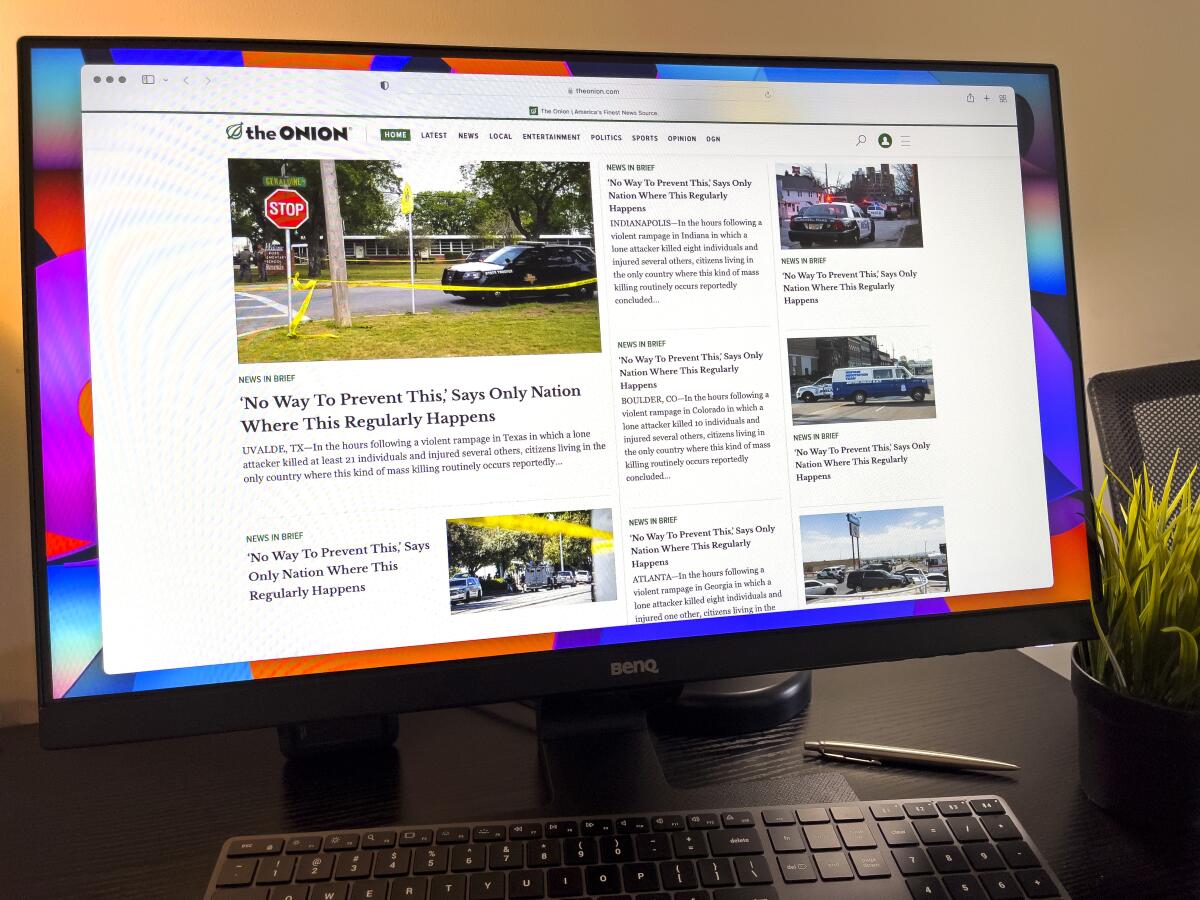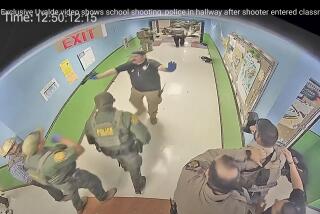Commentary: Why the Onion’s take on the Uvalde shooting captures every parent’s worst nightmare

It’s the yellow caution tape that gets to me when I look at the pictures tweeted by the satirical website the Onion in the wake of the massacre at Robb Elementary School in Uvalde, Texas, yesterday. Emblazoned with the words “Sheriff’s Line Do Not Cross,” the yellow tape is draped around the schoolyard after an 18-year-old man gunned down 19 small children who had recently finished their honor-roll ceremony.
Yellow is a bright, cheery color. It’s one of my 6-year-old daughter’s favorites. It’s the color of the sun, of sunflowers, of balloons and candy. It’s the color of her hair — soft and fine as corn silk.
On police tape, however, yellow is the color of every parent’s worst nightmare: that their child’s school became the target of yet another mass shooting, and that maybe their precious baby has been violently murdered.
It’s a fear we have lived with since the unthinkable tragedy at Sandy Hook Elementary in 2012, after which absolutely nothing was done to effect change when it comes to guns in America. In fact, since 20 children were shot down in cold blood in Newtown, Conn., gun laws have actually loosened in this country. The U.S. Supreme Court is expected to soon deliver a decision undoing a long-standing New York law that forbids people from carrying guns in public without first demonstrating a “special need” for self-defense.
This morning, the Onion devoted its entire home page to dozens of images from mass shootings dating back to 2014, accompanied by the same devastating headline: “‘No Way To Prevent This,’ Says Only Nation Where This Regularly Happens.”
The picture at the very top is the one of Robb Elementary in Uvalde, with the yellow tape circling a schoolyard that should have been filled with joyful kids. The image made the rounds across Twitter and trended rapidly. The Onion has a history of cutting to the chase when it comes to moments of extreme national tragedy in the way that only razor-sharp satire can. No one looking at it was laughing, though. Especially not parents, for whom that specific set of signifiers has a particularly horrific resonance.
The image of yellow tape, paired with police cars, sirens flashing, in front of a school — that’s the image that fills parents with the kind of grief they can taste. The kind that keeps them up at night, wondering if one day they too will have to face such a scene at their child’s school.
The crushing news out of Uvalde came about an hour before I was due to pick up my 6-year-old and her best friend from kindergarten. I could not get to the elementary school fast enough. My heart pounded, and I wiped at my eyes because I couldn’t see through my tears to drive. The radio didn’t help, as the scope and scale of the carnage in Texas began to crystallize. I was not alone in my race to get to my child. The schoolyard was filled with parents who had shown up early, who could not wait to wrap arms around their babies. Our worried, pained eyes met as we hustled toward the pickup line. But we didn’t speak. We couldn’t. What would we say?
The bell rang, and children burst forth from the school doors — yelling and laughing, chasing one another and running to their waiting parents. Little kids full of giggles and questions, wearing clothes dirty from play, shoelaces untied, hair messy, faces caked in food, bearing lopsided smiles.
As we walked back to the car, my daughter and her friend chattered on about the dance party they had in school and the glow-in-the-dark bracelets they got as a special treat. They wore paper crowns that they made in art class, decorated with tender kid drawings: smiling faces, stick arms, flowers and birds.
The worry and fear were more palpable this morning, as parents who had spent the night stewing in this new horror were further processing its vast implications — and realizing that this grief was theirs to shoulder forever, maybe, unless actual change was made in favor of common-sense gun legislation.
This week had been spirit week at Robb Elementary, and Tuesday was foot loose and fancy-free day, with the kids encouraged to wear their fanciest footwear. We parents had to grapple with images of tiny bodies in glittery, fabulous shoes — shoes that made the morning fun and exciting to kids who were still learning to read. I thought about that as I put my daughter’s feet into her own glittery shoes as we got ready for school today. They are the kind that light up when she runs. She finds so much joy in those shoes. Because little kids can find joy in anything.
I thought about not taking my daughter to school this morning. But I did. And I wasn’t alone. We parents got up and did it again. As we walked toward the main doors, we held our children’s hands a bit more tightly. Many parents got down on their knees at the school gate and hugged their kids longer than usual. Our eyes still filled with worry. We were not yet ready to speak.
I haven’t been able to stop thinking about a conversation I had with my daughter a few nights ago, just before the nightmare in Uvalde. I had just put her to bed, when she got up again and came timidly into my room. She said two things were “concerning her.”
She asked if dying meant she would never imagine anything again. I said that was likely the case. I told her everyone dies. That her daddy would die one day, that I would and that she would too. But, I said, she didn’t have to worry about that for a long, long time.
She asked how people die. I told her it happens when our hearts stop beating — from sickness, or accidents, or when we are very, very old.
She nodded and then said, “Maybe if I die, I’ll come back as a little baby somewhere else.”
“Maybe,” I said. “Some people believe that. Your grandma Boo always said she would come back as a yellow butterfly. That’s why when we see yellow butterflies, we think of her.”
She thought about this for a moment.
“I’m going to come back as a black and white cat,” she said. “And I’m going to show up at your door, and you’ll know it’s me. I’ll push up against your door, and I won’t go.”
I liked the image of the cat, but I didn’t at all like the idea that I would still be around when she was not.
I told her, “Oh, sweetheart, I hope I’ll be long gone before then.”
“What do you mean?” she asked.
I said, “I hope I die before you. Mamas should die before their babies.”
“Most mamas and daddies stay alive until their babies are gone,” she said.
I could tell she needed me to say I’d never leave her, so I said, “OK, deal. I’m not going anywhere, as long as you promise not to either.”
“Deal,” she said.
I kissed her and tucked her back in. Then I went to my room and cried my eyes out.
Parents aren’t supposed to lose their babies. We aren’t supposed to show up at school to be confronted by the shock and horror of yellow tape and police cars on a clear blue day just before summer vacation is about to begin. We aren’t supposed to digest one mass shooting after another after another, always hoping that the bullets won’t one day fly closer to home.
And we should never have learned to accept the standard line after such a tragedy occurs, the one currently blanketing the Onion’s home page in a heart-shattering tableau of yellow tape and emergency vehicles. Like a relentless funeral dirge, it reads: “‘No Way To Prevent This,’ Says Only Nation Where This Regularly Happens.”
More to Read
The biggest entertainment stories
Get our big stories about Hollywood, film, television, music, arts, culture and more right in your inbox as soon as they publish.
You may occasionally receive promotional content from the Los Angeles Times.











